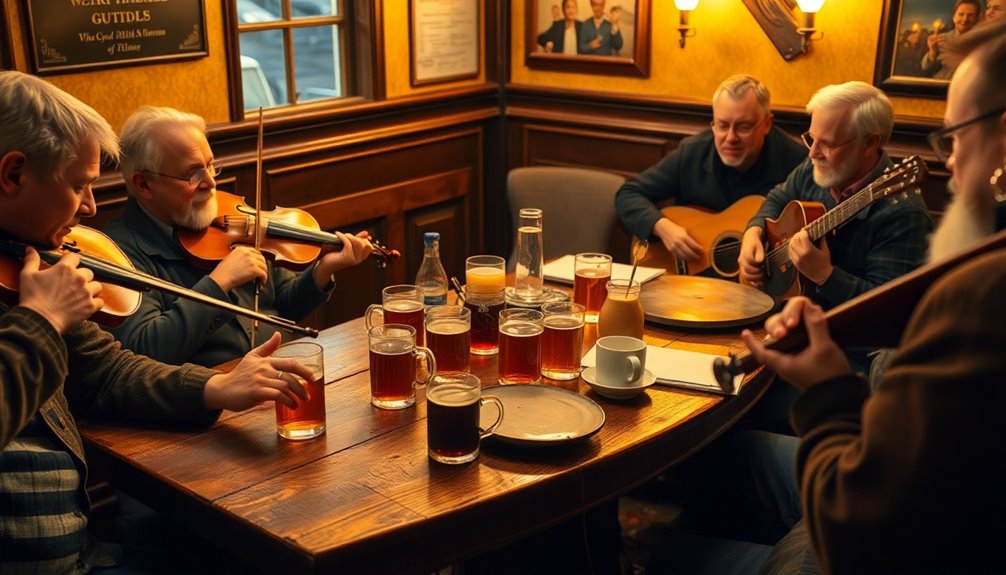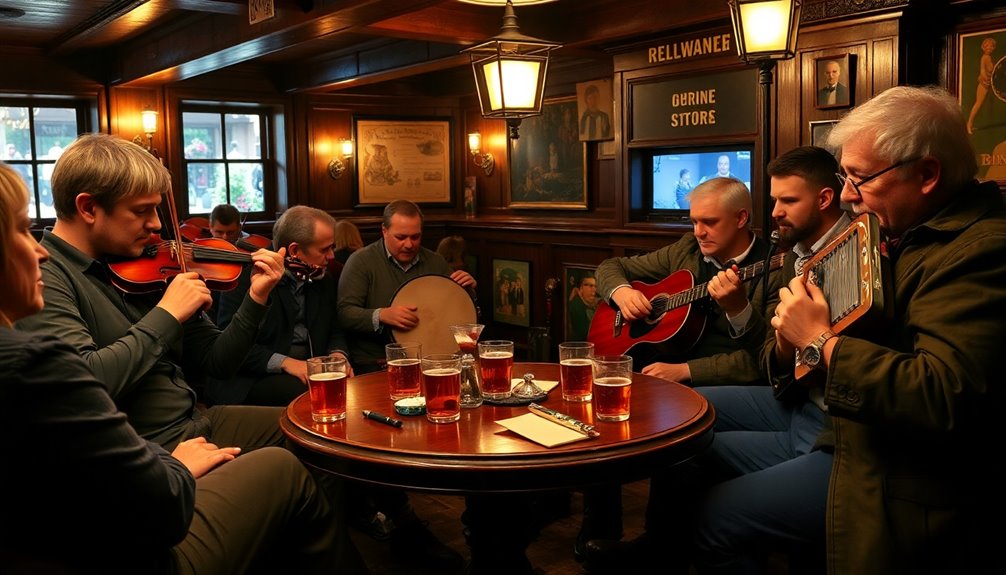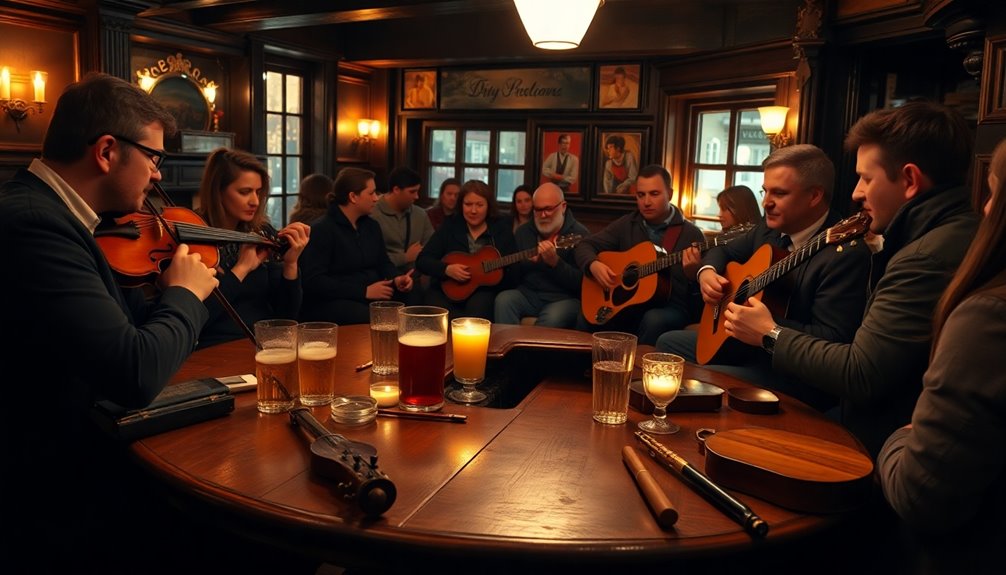
Irish music sessions are relaxed gatherings where people play tunes, chat, and welcome newcomers, so you’ll get casual listening and speaking practice. You can watch, join in on simple rhythms, or ask friendly players about terms like reel, jig, or ornamentation. Sessions expose you to local expressions, short exchanges, and natural turn-taking, which builds confidence. You’ll learn session etiquette—when to play, how to introduce yourself, and how to follow cues—and you can pick up more practical tips below.
Highlights
- Informal gatherings where people play traditional Irish tunes while newcomers listen, practice instruments, and chat in English.
- Great low-pressure settings for conversational English through greetings, song introductions, and brief social exchanges.
- You’ll hear everyday vocabulary, idioms, and cultural expressions tied to music and local life.
- Newcomers should observe etiquette: introduce skill level, wait to be invited, and follow turn-taking cues.
- Start by listening, join simple tunes when ready, and use post-session conversations to reinforce language learning.
What Happens at an Irish Music Session
When you walk into an Irish music session, you’ll usually find a group of people sitting in a circle or around a table, tuning instruments and warming up their fingers. You’ll notice session dynamics: someone leads a tune, others follow, and turns shift naturally. You can listen, play along, or ask to join. Repeats and signals guide pace, so you won’t feel lost. Music improvisation appears in subtle variations and ornaments, not wild changes, letting you experiment safely. The atmosphere values respect, openness, and freedom to try things at your own pace while learning rhythms and social cues.
Why Sessions Are Great for English Practice
You’ll get real conversational practice as people chat about tunes, instruments, and plans between sets. You’ll also hear cultural language—idioms, local expressions, and song lyrics—that help you understand everyday Irish English. Both kinds of exposure make it easier to use language naturally in real situations.
Real Conversational Practice
Because sessions bring people together in a relaxed, social setting, you get to practice real conversation—not scripted lines or textbook drills. You’ll join in chats between tunes, ask simple questions, and respond naturally. This kind of language immersion helps you notice phrases, rhythm, and timing without pressure. You can try new words, correct mistakes in the moment, and hear friendly feedback. Sessions let you choose your level of participation, so you feel free to speak when ready. Over time, those brief exchanges build confidence, fluency, and a more instinctive grasp of everyday English.
Cultural Language Exposure
Although music sessions are fun, they’re also a window into everyday Irish English—its idioms, humor, and local phrases—so you’ll hear words and expressions that don’t always appear in textbooks. You’ll get natural language immersion: people chat between songs, joke, and correct each other gently. You can pick up slang, pronunciation, and rhythm of speech without pressure. It’s a relaxed cultural exchange where you choose how much to join. Bring curiosity, ask about meanings, and practice phrases. Over time you’ll feel freer using authentic expressions, understanding context, and sounding more like a local while keeping your own voice.
Common Instruments and Musical Terms to Know

In an Irish music session you’ll meet a handful of instruments and common terms that help you follow the tune: fiddle, tin whistle, flute, bodhrán, accordion, and guitar are the main sounds, while words like reel, jig, set, and session tell you the rhythm and context. You’ll hear about traditional instruments and musical terminology that describe tempo, ornamentation, and structure. Learn basic words like bowing, cuts, rolls, and accompaniment. This helps you listen freely, join conversations, and enjoy music without pressure. Keep vocabulary small, practice by ear, and let the session guide your learning and confidence.
How to Join a Session: Practical Steps
You can start by looking for local sessions online, on community boards, or by asking at music shops and cafés. When you join, listen first, introduce yourself briefly, and let others know your skill level. Don’t worry about mistakes—most players are friendly and will help you take part.
Finding Local Sessions
Looking for a local session to join? Use simple steps: search online for local venues, community centers, pubs, and music schools. Check session maps on websites or apps to see times and locations. Ask at tourist offices, language schools, or social media groups for recommendations. Look for signs or posters when you walk around town. Note transport, entry costs, and start times so you can arrive relaxed. If you find multiple options, pick one that feels open and friendly. Keep a short list on your phone so you can try different sessions and enjoy the freedom to choose.
Joining and Participating
1 clear step makes joining easier: introduce yourself to the host or a player when you arrive, say you’re learning English and would like to listen or join in, and ask where they’d like you to sit or what tune group is playing. Then observe session etiquette: wait to be invited into the circle, keep volume respectful, and avoid interrupting calls. If you play, show basic instrument familiarity by tuning and practising a simple reel or jig beforehand. Start by listening, clap or hum along, and join when cues feel right. You’ll gain confidence and enjoy music and conversation freely.
Cultural Etiquette and Interaction Tips

Although sessions are relaxed, it’s polite to follow a few simple customs so everyone feels welcome. You’ll notice cultural norms like friendly greetings, waiting your turn, and listening while others play. Match local social behaviors: clap politely, avoid interrupting, and ask before joining a tune. Be open, but don’t dominate conversation or space. If someone offers feedback, accept it with thanks. Keep phone use low and arrive on time when you can. These small choices show respect and help you connect freely with players, making sessions more fun and useful for your language learning.
Ways to Prepare and Follow Up for Language Learning
If you want to get the most language practice from Irish music sessions, prepare beforehand and follow up afterward to reinforce what you learn. Beforehand, use language resources like simple lyrics, phrase lists, and audio to build confidence. For session preparation, pick a few target words or lines to focus on, practice pronunciation, and note questions to ask. During the session, listen actively and join when you feel ready. Afterward, review recordings or notes, shadow lines, and add new vocabulary to flashcards. Reflect on progress and set one clear goal for the next session to keep your learning free and focused.
Some Questions Answered
Can I Bring a Non-Musician Friend Who Doesn’t Speak English Well?
Yes — you can bring a non-musician friend who doesn’t speak English well. They’ll enjoy non musician involvement by listening, clapping, or sharing simple smiles; sessions welcome cultural exchange and curiosity. You can translate or point out tunes, gestures, or rhythm to help them join. The setting’s relaxed, so they won’t feel pressured. Encourage freedom to observe, move, or chat slowly — participation’s about feeling comfortable, not speaking perfectly.
Are Sessions Suitable for Complete Beginners in Music?
Yes — you can join even as a complete beginner: you’ll watch, you’ll listen, you’ll try. You’ll bring beginner instruments like tin whistle or bodhrán, you’ll learn simple tunes, you’ll follow session etiquette by listening first and keeping volume low. You’ll make mistakes, you’ll ask questions, you’ll improve. Sessions welcome curiosity, respect, and freedom to explore; they’re safe spaces for steady, joyful learning at your own pace.
Do Sessions Charge an Admission Fee or Seek Donations?
Usually there’s no strict admission policy; you won’t be turned away at the door. Many sessions are free to enter, though venues sometimes suggest a small contribution. Hosts often welcome donation expectations as a way to support musicians or the pub. You can choose to give what feels right — nothing, a few coins, or more. This keeps participation open and respects your freedom to contribute as you wish.
Can I Record the Music for Personal Study?
Like a gentle wave, yes — you can usually record for personal use, but you should follow recording etiquette: ask the host or players first, turn off bright lights and keep the device unobtrusive, and don’t share or sell the audio. Respect musicians’ wishes; some may decline or ask you to delete recordings. If they agree, record quietly to aid your study, knowing your freedom comes with responsibility to the group.
Are There Online or Virtual Irish Sessions Available?
Yes — you can join virtual session platforms like Zoom or Discord, and many groups livestream on YouTube or Facebook. You’ll enjoy online participation benefits: flexible timing, access to tutors and varied tunes, and chance to practice language and music from anywhere. You’ll get recorded sessions to revisit, meet a wider community, and choose sessions that fit your pace. Pick ones that welcome learners and respect your freedom to explore.
Summing Everything Up
You’ll find Irish music sessions welcoming and lively, and they’re great places to practice English naturally. Like a river that carries everyone along, the music helps conversation flow and reduces stress about mistakes. Go listening first, introduce yourself briefly, and ask questions—people will usually help. Learn a few common words and polite customs beforehand, and reflect afterward on new vocabulary and phrases so each session boosts both your confidence and language skills.
